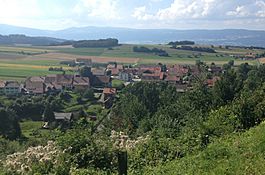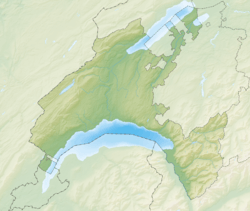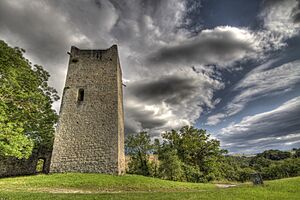Molondin facts for kids
Quick facts for kids
Molondin
|
||
|---|---|---|
 |
||
|
||
| Country | Switzerland | |
| Canton | Vaud | |
| District | Jura-Nord Vaudois | |
| Area | ||
| • Total | 5.49 km2 (2.12 sq mi) | |
| Elevation | 611 m (2,005 ft) | |
| Population
(Dec 2020 )
|
||
| • Total | 252 | |
| • Density | 45.90/km2 (118.9/sq mi) | |
| Postal code |
1415
|
|
| Surrounded by | Chavannes-le-Chêne, Chêne-Pâquier, Démoret, Donneloye, Mézery-près-Donneloye, Prahins, Rovray, Yvonand | |
Molondin is a small town, called a municipality, in Switzerland. It's located in the Vaud canton, specifically in the Jura-Nord Vaudois district.
Contents
Molondin's Past
Molondin was first written about in the year 1380. Back then, it was known by names like Mollondens or Mollendens.
Where is Molondin?
Molondin covers about 5.5 square kilometers (2.1 square miles) of land. A big part of this land, about 66.5%, is used for farming. Forests cover almost 30% of the area. The rest, about 4.4%, has buildings and roads.
The village itself is found on a flat area, or plateau. It is located south-west of a valley called Vallon des Vaux. Molondin used to be part of the Yverdon District. But in 2006, it became part of the new Jura-Nord Vaudois district.
Molondin's Coat of Arms
A coat of arms is like a special symbol for a town or family. Molondin's coat of arms shows a tower with a wall. The background has eight stripes, alternating blue and gold. The tower and wall are silver with black outlines.
Molondin's People
Molondin has a population of about 200 people. A small part of the population, about 11.8%, are people from other countries. Over the last 10 years, the number of people living here has grown by about 6.8%. Most of this growth is from people moving into the town.
Languages Spoken
Most people in Molondin speak French. About 95% of the population uses French as their main language. A smaller number of people speak German (about 3.9%). Even fewer speak English (about 0.6%).
Age Groups
In Molondin, about 8.8% of the people are young children (0-9 years old). Teenagers (10-19 years old) make up about 15.1% of the population. Adults between 20 and 59 years old make up about 51.2%. Older adults (60 years and up) make up about 24% of the population.
Population Changes Over Time
The chart below shows how Molondin's population has changed through the years:

Important Heritage Sites
A heritage site is a place that is important for its history or culture. The old castle ruins and the abandoned settlement at Saint-Martin-Du-Chêne are very important. They are listed as a Swiss heritage site of national significance. This means they are protected and valued across the country. The entire village of Molondin is also part of the Inventory of Swiss Heritage Sites.
Molondin's Economy
In Molondin, people work in different areas. Many work in the primary sector, which means jobs like farming. There are about 56 people working in this area. A smaller number, about 7 people, work in the secondary sector. This includes jobs like manufacturing or construction. About 23 people work in the tertiary sector. These jobs are mostly in services, like sales or restaurants.
Many people who live in Molondin travel to other towns for work. About 42 people leave the village to work elsewhere. Only about 9 people come into Molondin for their jobs. Most people use a private car to get to work.
Religion in Molondin
Based on information from 2000, most people in Molondin belong to the Swiss Reformed Church, about 71.3%. A smaller group, about 11%, are Roman Catholic. Some people belong to other Christian churches. About 8.8% of the population do not belong to any church.
Education in Molondin
In Molondin, about 35.4% of adults have finished high school. About 9.4% have gone on to get a higher education, like from a university.
In the 2009/2010 school year, there were 31 students in Molondin's school district. In the Vaud canton, children can go to two years of non-required pre-school. The main primary school program lasts for four years. There were 14 students in the primary school program in Molondin. After primary school, students go to a lower secondary school for six years. There were 17 students in these schools.
Some students from Molondin go to schools outside the village. Also, a few students from other villages come to school in Molondin.
 | Claudette Colvin |
 | Myrlie Evers-Williams |
 | Alberta Odell Jones |





